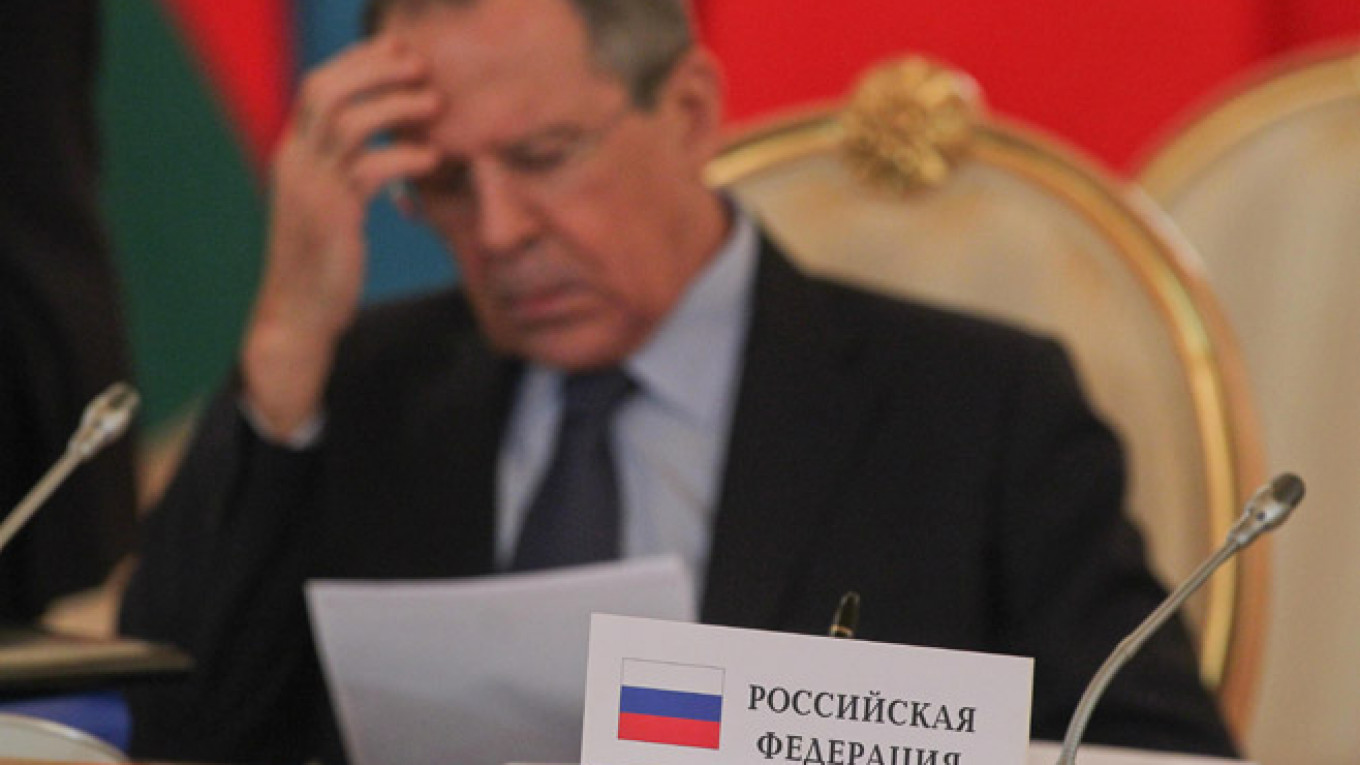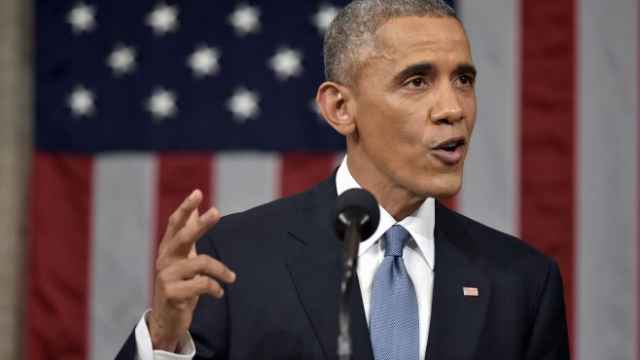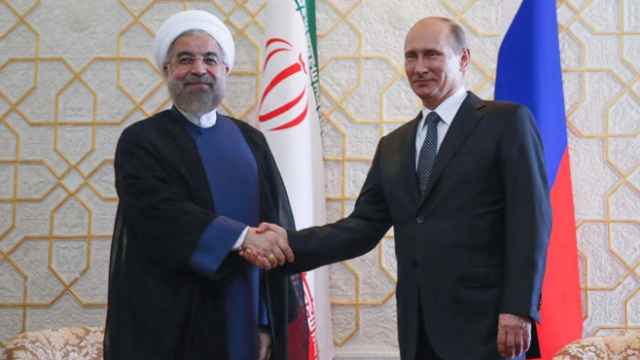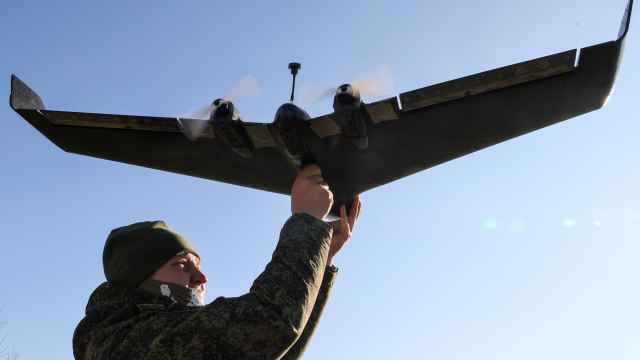Russia is determined to play a leading role in the new multipolar world that the United States relentlessly opposes and will not give up on Ukraine until a desirable outcome is reached, Foreign Minister Sergei Lavrov told journalists during an annual news conference Wednesday.
Moscow wants to see Ukraine transformed into a federal state, offering autonomy to the restive regions in the country's east, said Lavrov, who has taken center stage in international diplomacy during the last year.
"Ukraine needs to implement constitutional reform, but the current leadership wants it to remain a unitary state in its strictest form," Lavrov told the crowd of reporters that filled the conference room of the ministry's new building in central Moscow.
A federalized state structure would make it much more difficult for Ukraine's leadership to fulfill its eventual ambition of joining NATO and the European Union, and would also give Russia permanent leverage in the country's internal politics via the pro-Russian eastern regions.
The leitmotif of Lavrov's speech was that Russia is constantly being sidelined on the international arena due to Western hypocrisy and double standards, with the United States' urging of other nations to pass sanctions against Russia and the cancellation of the South Stream gas pipeline project under pressure from the EU singled out as examples of this.
Crimea 'an Exception'
Lavrov arrived ready to field questions about Crimea and Russia's role in the Ukrainian conflict, extensively quoting Dmitro Yarosh, the leader of Ukraine's nationalists, to prove that there was a real threat to Russians who live there.
He signaled, however, that Russia does not have designs on any more Ukrainian territory and that Crimea, which was annexed by Moscow last March, was an exceptional case.
"The unconstitutional coup [in which Ukraine's former president Viktor Yanukovych was overthrown] has undermined Ukraine's right to exert sovereignty over some of its regions," Lavrov said.
"We did not sign up [to the 1994 Budapest Memorandum] to support meddling in Ukraine's internal affairs or to support a violent unconstitutional coup," he said. The memorandum's signatories, including Russia, pledged to "respect Ukrainian independence and sovereignty within its existing borders."
Lavrov said Russia would lobby for the United Nations General Assembly to pass a resolution that would recognize violent unconstitutional coups as an unacceptable form of regime change.
Where is the Proof?
After some journalists asked about Russia's military presence in Ukraine, Lavrov said he needed concrete proof of it in order to discuss the subject. The presence of Russian troops and weapons in east Ukraine has been widely reported by Western and some Russian media, though the Kremlin denies the allegations.
On Wednesday, the Kiev government accused Russia of boosting its military presence in Ukraine by sending more troops over the border. After several months of relative calm, fighting between pro-Russian insurgents and Ukrainian army troops has intensified dramatically in the last two weeks.
Lavrov also said that Western nations had failed to present any evidence of Russian involvement in the Malaysia Airlines Flight 17 crash in eastern Ukraine last July. Western leaders have said the plane was likely downed by a missile supplied to the rebels by Russia.
"In contrast to the Ukrainian leadership, we have never said bad words about Ukraine," Lavrov concluded.
No Longer No. 1
Lavrov hit back at U.S. President Barack Obama, who in his State of the Union speech Tuesday said that Russia is isolated, while its economy is "in tatters."
"Yesterday's speech by the president shows that there is only one concept at the center of the [U.S.] philosophy: 'We are number one and everyone else has to respect that,'" Lavrov said.
"NATO cannot accept that the unconstitutional coup in Ukraine has not led to the subjugation of the whole Ukrainian nation," he said.
The United States' role as global leader will gradually diminish, Lavrov said, citing as evidence Obama's change of heart in 2013 on using force in Syria after Russia offered to take control of the country's chemical stockpile.
Lavrov said that he reads The New York Times and its Syria coverage in particular, but recommended that people watch Russian coverage of the Ukraine conflict in order to get another point of view. In addition, the foreign minister said he does not meet with any of his international counterparts as frequently as he does with U.S. Secretary of State John Kerry.
On the subject of Iran, Lavrov said that he expects the six powers — Britain, China, France, Germany, Russia and the United States — to reach an agreement on the country's nuclear program by a deadline set for the end of June.
Impossible to Isolate
Western countries want to isolate Russia, but they will not succeed, as it will continue to work with its partners within the BRICS and Shanghai Cooperation Organization (SCO), Lavrov said.
Dozens of countries have expressed an interest in signing free trade agreements with the Moscow-led Eurasian Economic Union that currently consists of Russia, Belarus and Kazakhstan, the foreign minister said, without naming them. He also said that Russia was ready to sign a free trade agreement between the Eurasian Economic Union and the EU.
Russia will hold a joint BRICS and SCO summit in the central Russian city of Ufa in July this year, where the question of India and Pakistan's accession to the SCO will be discussed, Lavrov said.
Contact the author at [email protected]
A Message from The Moscow Times:
Dear readers,
We are facing unprecedented challenges. Russia's Prosecutor General's Office has designated The Moscow Times as an "undesirable" organization, criminalizing our work and putting our staff at risk of prosecution. This follows our earlier unjust labeling as a "foreign agent."
These actions are direct attempts to silence independent journalism in Russia. The authorities claim our work "discredits the decisions of the Russian leadership." We see things differently: we strive to provide accurate, unbiased reporting on Russia.
We, the journalists of The Moscow Times, refuse to be silenced. But to continue our work, we need your help.
Your support, no matter how small, makes a world of difference. If you can, please support us monthly starting from just $2. It's quick to set up, and every contribution makes a significant impact.
By supporting The Moscow Times, you're defending open, independent journalism in the face of repression. Thank you for standing with us.
Remind me later.






